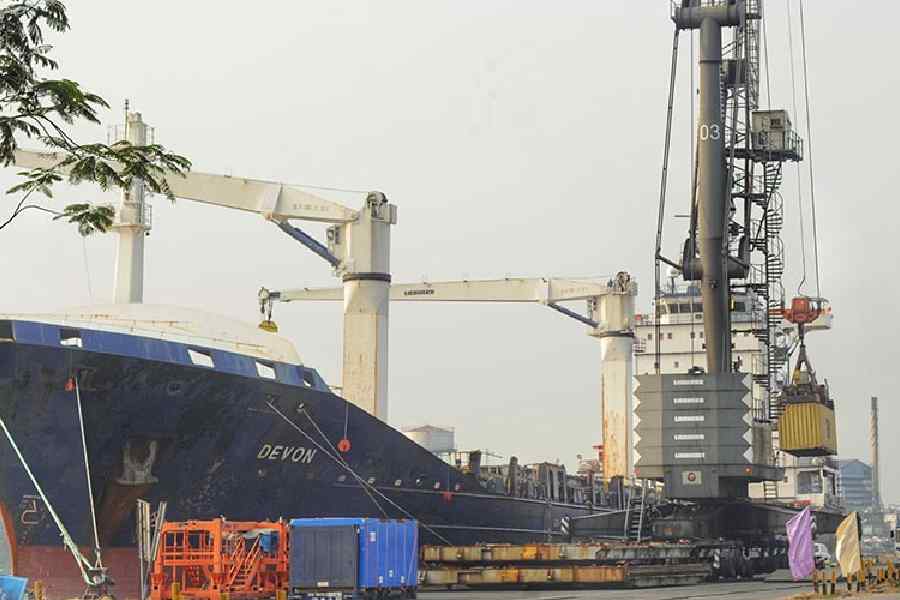A clutch of port operators, including Adani and DP World, has expressed interest in the development and mechanisation of two berths at Netaji Subhas Dock under Kolkata Dock System.
The berth numbers 7 and 8 are dedicated to handling containers at KDS. The project under the private-public-partnership (PPP) mode involves the reconstruction of berth 8 and the mechanisation of berths 7 and 8 for an estimated investment of ₹700 crore.
Six entities have participated in the tender floated by Syama Prasad Mookerjee Port, Kolkata (formerly Kolkata Port Trust), which manages twin port systems at Kolkata and Haldia, for the project. Apart from Adani and DP World, J.M. Baxi & Co, Navayuga Group and Century Ply are some of the entities who participated in the tender, an SMPK official said.
The project involves, among others, the installation of rail rail-mounted quay crane (RMQC) which will ensure faster handling of container cargo and thereby expand the capacity of the berth.
“At NSD Kolkata, we handle containers. We are going through the development of berths 7 & 8 under PPP. We have got six RFPs. People have participated. Now it has gone for security clearance (from the Centre). As soon as we get the clearance, we will open the quotes and award the tender,” Rathendra Raman, chairman of SMPK, told this newspaper.
The 30-year concession on DBFOT (design, build, finance, operate and transfer) basis will go to the highest bidder. The operator who will be offering the highest royalty per TEU of container cargo handled at the project facilities will be declared as the highest bidder.
The chairman pointed out that the new facility has the potential to handle 800,000 TEUs (twenty equivalent units), up from 500,000 TEUs. It would take about two years to complete the project, according to the tender document.
The new projects will come at a time bulk cargo movement at SMPK appears to be stagnating and the port authority is trying to reinvigorate container movements.
Historically, the port has focused on promoting KDS for containers and deeper drafted Haldia for bulk cargo movement.
Adani, for instance, has the mandate to modernise and operate a bulk cargo berth at Haldia. It is also going to start as an operation and maintenance (O&M) contractor for container handling for five years for NSD berths 1-4 from December.
In the first five months of this fiscal, KDS handled 258,000 TEUs, marginally down from 265,000 TEUs it handled in the same period of 2023-24. In contrast, HDC handled 65,000 TEUs of container in April-August of 2024-25. Berth 7&8 handles 60 per cent of Calcutta’s container cargo already.
When the global maritime trade is increasingly tilting in favour of containers – two-thirds of cargo by value moves in container vessels – development and mechanisation of berths 7 & 8 will play an important role going forward. In the past, there was an attempt to develop a container port at Kulpi by DP World. However, the project never materialised.
A section of port veterans believe that SMPK should equally promote Haldia for container movement, as it can handle bigger ships. “Due to the bends in the river channel, ships no longer than 160-170 meters can come to KDS. In contrast, Haldia can handle ships of 230 metres. The port should try to bring more vessels in Haldia than Calcutta,” a port veteran pointed out.
Recently, the port started two direct services to south China and Zabel Ali, Dubai, allowing trade to directly ship containers from SMPK to these destinations, instead of routing through transhipment hubs such as Colombo, Singapore and Port Klang in Malaysia.
While the direct service to UAE’s Jebel Ali has started from Haldia, the service to Xiamen and Shekou will touch down in Singapore. Port officials believe the direct service will bring down transit time and bring additional volume to SMPK.
“The port was happy to be a feeder port to container transhipment hubs. The direct service will change that perception,” said a port observer.










